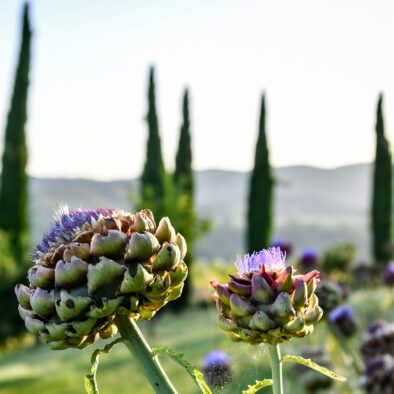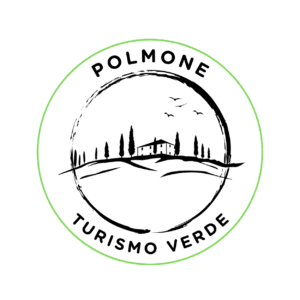Enjoy your peace and quiet at Polmone
We welcome you to this wonderful hill
THE STORY OF POLMONE
Ah, so that's where you guys live...!
When we tell Italians here where we live, we often hear that they used to live nearby or had family there.
They all say that it is so beautiful here, but that they also find it very remote, quiet and wild.
If you look around here carefully, you will see many old farms on the hills around us; most of them now ruins.
This area was once more densely populated and entire families of up to 25 people lived in the farms, called poderi or casali. How did it come about that it is now practically a wild nature reserve and how was Polmone ultimately saved from the same fate of falling into ruin?
The Mezzadria system
During the 18th and 19th centuries, the traditional agricultural system of the mezzadria was practiced here in Central Italy. This system was based on a form of shared agriculture, where the landowner, known as the 'padrone', owned the land and the farmers, the mezzadri, worked the land. The division of the harvest was usually fifty-fifty (mezzo means half) with the mezzadri keeping half of the harvest and giving the other half to the padrone. This system ensured that the mezzadri had a direct stake in the success of the harvest, as their own prosperity also depended on the land's yield.
The mezzadri were responsible for cultivating the land, sowing, harvesting and maintaining the crops. They often worked long hours and had a strong bond with the land they worked. The system offered them a degree of protection, as they had a roof over their heads and could use part of the proceeds for their own livelihood.
Although the system offered some stability to the mezzadri, there were also disadvantages. The mezzadri had limited control over the land and depended on the padrone for important land use decisions. Furthermore, the system could lead to economic inequality, as the padrone often benefited more from the proceeds than the mezzadri. Conflicts between the padrone and the mezzadri were of course to the detriment of the latter.
Idleness and vacancy
From the 1950s onwards, the Mezzadria system gradually disappeared, mainly due to changes in agricultural practices and the emergence of more modern forms of agriculture, but also due to the political shifts after the Second World War. The new political wind blowing through Italy considered the system archaic and unfair.
There was then a significant exodus as the younger generation preferred to live in industrialized urban areas; hard work without much return was no longer timely. It soon became no longer profitable for those who stayed behind to continue working the land. The farms became empty. The landowners kept the land and farms but no longer carried out any maintenance on them.
From the 1980s onwards there was a small change in the history of the old poderi and casali in this neighborhood. Adventurous young people from home and abroad bought up the empty farms here and there from the old padroni to renovate them and live in them.
And there Polmone's story begins:
An old podere, lonely on a hill
The founders of this beautiful spot in Umbria, from whom we were allowed to take over the baton of the holiday rental, Roos Zwager and Nico van der Meer, went unannounced to visit an old colleague of theirs who had just bought an old farmhouse in the fields around Pornello with her Italian husband. It turned out that there was another farm for sale, not far from theirs. Curious, they went to take a look. There was little more than the wall of an old pigsty, and the roof of the farm itself had collapsed in places. Yet Roos and Nico were immediately captivated by the fantastic location and the all-round view of the Fersinone valley. The peace and quiet, you would only hear the birds singing and the grazing of the white cows in the fields around the farm.
Despite the challenge they saw in it, they decided to buy the farm and go for this adventure. Little by little and year after year, they saw the results of their efforts. A dirt road was built and with the help of friends, neighbors and family, the old farm was reconstructed. The roof was repaired, and gradually a layout for the later apartments emerged.
In the summer of 1990 they were able for the fisrt time to properly inhabit the podere Polmone, which turned out to be the original old name of the building. There was still no water or electricity, there was no toilet or shower, the windows on the north side were open holes and all the interior walls were still stones with clay piled between them through which the lizards crawled.
It was perhaps their best time here on the hill. Every morning the neighbor brought a huge wine bottle (damigiana) with water. They did everything with it: laying bricks, making tea, cooking and washing dishes. In the late afternoon they walked to what they called their bathroom: a bowl between the rocks about a kilometer from Polmone, where water pooled and ended in a kind of waterfall. They could wash themselves in that. Of course it was freezing!
Behind the old pigsty, a hole was dug as a toilet, soon converted by Nico into a proper loo.
For the power supply, Nico and Roos' brother rolled out a cable across the fields from Polmone to the neighbors who did have power. The cable was far too heavy to lift, so the men placed the roll in the trunk of the car. Nico took the wheel, straight through the hills, with Roos' brother in the trunk to slowly unwind the cable.
There was power! But if Nico had to drill, it meant that Roos had to stop making the curtains on the sewing machine.
That summer they managed to almost complete the Simpatica apartment. And during the autumn holidays they were able to open that apartment and even receive the first guests!
In the years that followed, they continued to renovate and the other apartments were also built. And every year more guests found their way to Polmone.
Another house on the hill
Enterprising as they were, they decided in the mid-1990s to expand the business even further with a separate house at some distance from the holiday apartments. Permits were applied for and obtained, and Nico and Roos again set to work, unperturbed. The new house was built, among other things, from stones that were collected from a newly cleared field nearby, stone by stone! Gradually, the area around Polmone took the shape it has today, complete with beautiful garden, parking and lovely swimming pool.
Since the beginning of this century, Roos and Nico have lived here all year round, and received many guests and family in the more than twenty years that followed. With heavy hearts, in 2021, they decided to sell Polmone after more than 30 years. They wanted to sell this wonderful business while they were still fit enough and not wait until the management and maintenance would become too much for them.
Never again a ruin
When you arrive here and cover the last 3 kilometers on the gravel road, you may wonder at first where on earth it is taking you. And isn't it just beautiful when you drive past the last hill and see Polmone with all its cypresses looming?
For Polmone it has been such good fortune that two enterprising Dutchies saved this pearl in Umbria from oblivion!
Let's hear from you
We would love to hear what you think of our holiday apartments
Call us
We can be reached by telephone at +31 6 16474290 +31 6 27321066
Send an email
Sending an email is simple info@polmoneturismoverde.com
Just visit
Yes, it's not exactly next door, but we welcome you to our porch and make you feel at home with us, on this hill

